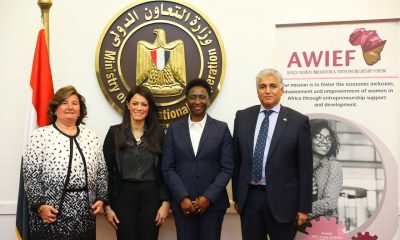Business Home
BAO Exclusive with Irene Ochem on AWIEF2022

AWIEF Founder/CEO, Ms Irene Ochem (Image: Supplied)
The Africa Women Innovation and Entrepreneurship Forum is heading to North Africa for the first time. The 2022 edition of AWIEF will take place on 26 and 27 September in Cairo, in partnership with Egypt’s Ministry of International Cooperation and co-organised by the Egyptian Businessmen’s Association. In this exclusive interview with Alaba Ayinuola, Ms Irene Ochem talks about AWIEF, its impact and AWIEF 2022 conference. Excerpts.
Alaba: To begin, could you briefly tell us about AWIEF, its annual conference and priority on the continent?
Irene: The Africa Women Innovation and Entrepreneurship Forum’s goal, simply put, is job creation, wealth creation and economic prosperity across the continent. Our mission is to foster women’s economic inclusion, advancement, and empowerment through entrepreneurship, support and development of micro, small and medium enterprises. This helps drive employment and economic growth.
We are also contributing to facilitating and enhancing intra-Africa trade and leveraging the opportunities of the African Continental Free Trade Area (AfCFTA). To achieve its objectives, AWIEF offers a range of enterprise development programmes that are tailored to the needs of entrepreneurs in Africa including accelerators, incubation, and other capacity building.
We also host our annual award-winning AWIEF conference, where we gather the best and the brightest from across the government, development, corporate, and entrepreneurship ecosystem for keynotes, interactive industry panel discussions and fireside chats on entrepreneurship, technology and innovation, development and trade, finance and investment, energy and infrastructure, climate change and sustainability, and agriculture and food security. The conference gives start-ups, SMEs and professionals a fantastic opportunity to learn from and connect with other industry players from across the African continent and beyond.
Alaba: Tell us more about this year’s conference and awards. What inspired this year’s theme, “Advancing Africa through Gender Integration”?
Irene: AWIEF2022 is a hybrid event which will take place on the 26 and 27 September on-site in Cairo, Egypt and virtually via our online event platform. The theme for this year’s event is inspired by the fact that no conversation about empowerment or entrepreneurship can, or should, exclude either women or men. Gender diversity and inclusion is vital for Africa’s economic growth.
Since its inception in 2015, the annual AWIEF has become Africa’s leading women entrepreneurship conference and awards event, bringing together high-level industry, developmental and business thought leaders, start-ups, and entrepreneurs for dialogue and discussions on issues of economic empowerment, entrepreneurship, investing, technology and innovation in Africa.
Regarding the AWIEF Awards, there are many outstanding women entrepreneurs and businesswomen across Africa who are driving growth, creating opportunities, and positively impacting the continent. In this, our 6th edition of the awards, we are once again enthusiastic to celebrate and shine the spotlight on these inspirational female entrepreneurs and share their stories of excellence and success.
Alaba: AWIEF2022 will take place in Egypt. Why the choice and what’s the catch?
Irene: Egypt is at the forefront of the African entrepreneurial and innovation ecosystem. Hosting AWIEF in a country known for its strong support for women’s economic empowerment and sustainable development is important for us. AWIEF was previously hosted in West Africa in Nigeria in 2015 & 2016, Cape Town (2017, 2018 & 2019). The event was fully virtual in 2020 and in 2021 the in-person conference was in Johannesburg. As a pan-African organisation it made sense to take it to North Africa this year.
Alaba: Who are your main partners and why did you decide to partner with them?
Irene: Last year, H.E. Dr Rania Al-Mashat was a speaker at the AWIEF conference and Egypt’s Ministry of International Co-operation is particularly focused on sustainable development, one of the key thematic areas on the AWIEF2022 agenda.
5). What do you intend to achieve with this year’s conference, and would you like to share some of your speakers?
Irene: We want entrepreneurs to come and learn from industry leaders, connect with potential investors and network with their counterparts from other parts of Africa to share their experiences and then take the lessons home to apply to their businesses.
For C-Suite executives and investors this is an opportunity to grow their network and potentially to connect with their next big project and to learn about new innovations and best practices from other countries.
NGOs and development sector organisations should see this as an opportunity to gain insights into the changing issues confronting the people they serve and learn from the successes and challenges shared by other organisations on the continent.
Our stellar line-up of speakers include:
- H.E. Dr. Rania Al-Mashat – Minister of International Co-operation, Egypt.
- Damilola Ogunbiyi – CEO and Special Representative of the UN Secretary-General for Sustainable Energy for All (SEforALL)and Co-Chair of UN Energy.
- Ayoade Alakija – WHO Special Envoy for the ACT-Accelerator, co-Chair of the African Union’s African Vaccine Delivery Alliance.
- Jackie Jones – Director, Gender Equality Division Office of the President & Chief of Staff, Bill & Melinda Gates Foundation.
- Ahmed Rezk – Deputy UNIDO Representative, Regional Hub in Egypt.
- Patricia Obozuwa – Vice President, Government Affairs, Communications & Sustainability for Africa, The Coca Cola Company.
- Brenda Mbathi – CEO, GE East Africa.
- Juliet Anammah – Chief Sustainability Officer, Jumia Group and Chairwoman, Jumia Nigeria.
- Gielan Elmessiri – Deputy Country Representative, UN Women, Egypt.
- Dolapo Kukoyi – Managing Partner, Detail Commercial Solicitors, NIgeria.
Alaba: AWIEF has really grown and recently launched some fantastic programmes. Tell us about these programmes and how does your organisation measure its impact?
Irene: Simply put, AWIEF’s impact is measured by how the lives of our alumni have changed after completing our programmes. It’s all about changing lives and livelihoods. We have seen more than 3500 graduates from our various programmes. They are growing their businesses, creating jobs and contributing positively to the economy.
Earlier this month, 100 SMEs in nine Southern African countries: Angola, Botswana, Eswatini, Lesotho, Malawi, Mozambique, Namibia, South Africa, and Zambia, completed the USAID-funded ‘Enhanced Small Medium Enterprises (SMEs) Investment and Export Readiness Through a Digital Platform’ program.
Our new African Development Bank (AfDB) funded programme “Solutions Catalysing Increased Access to Capital for the Success of Women Entrepreneurs” aims to accelerate efforts to address gender inequality to drive inclusive economic transformation. More than 500 growth-oriented WSMEs across 8 African countries will be supported for scale, access to markets and investment readiness. To date, more than 4 000 applications have been received for this programme.
Alaba: What are your thoughts on gender inclusion in Africa’s innovation and entrepreneurship ecosystem? How much progress have we made?
Irene: A lot of progress has been made, but there is still a lot of work to be done – especially in relation to access to finance for women entrepreneurs, access to markets, skills training and networks.
Alaba: Lastly, what should your audience expect from this year’s event?
Irene: High profile keynotes and interactive panel discussions will cover topics such as the 2030 Agenda for sustainable development, climate change & sustainability, creating an enabling environment for MSMEs and SMEs, innovation & technology, intra-Africa trade and the AfCFTA, energy, Infrastructure and industrialization, investment & financial services, health leadership, as well as agriculture & food security.
Come learn more about the latest trends, innovations, opportunities, and initiatives across the African entrepreneurship and innovation ecosystem, and then continue these vital conversations during our networking sessions, on-site in Cairo, Egypt, or virtually via our online event platform.
Economy
Africa must seize global trade disruption as ‘historic opportunity,’ leaders tell private sector
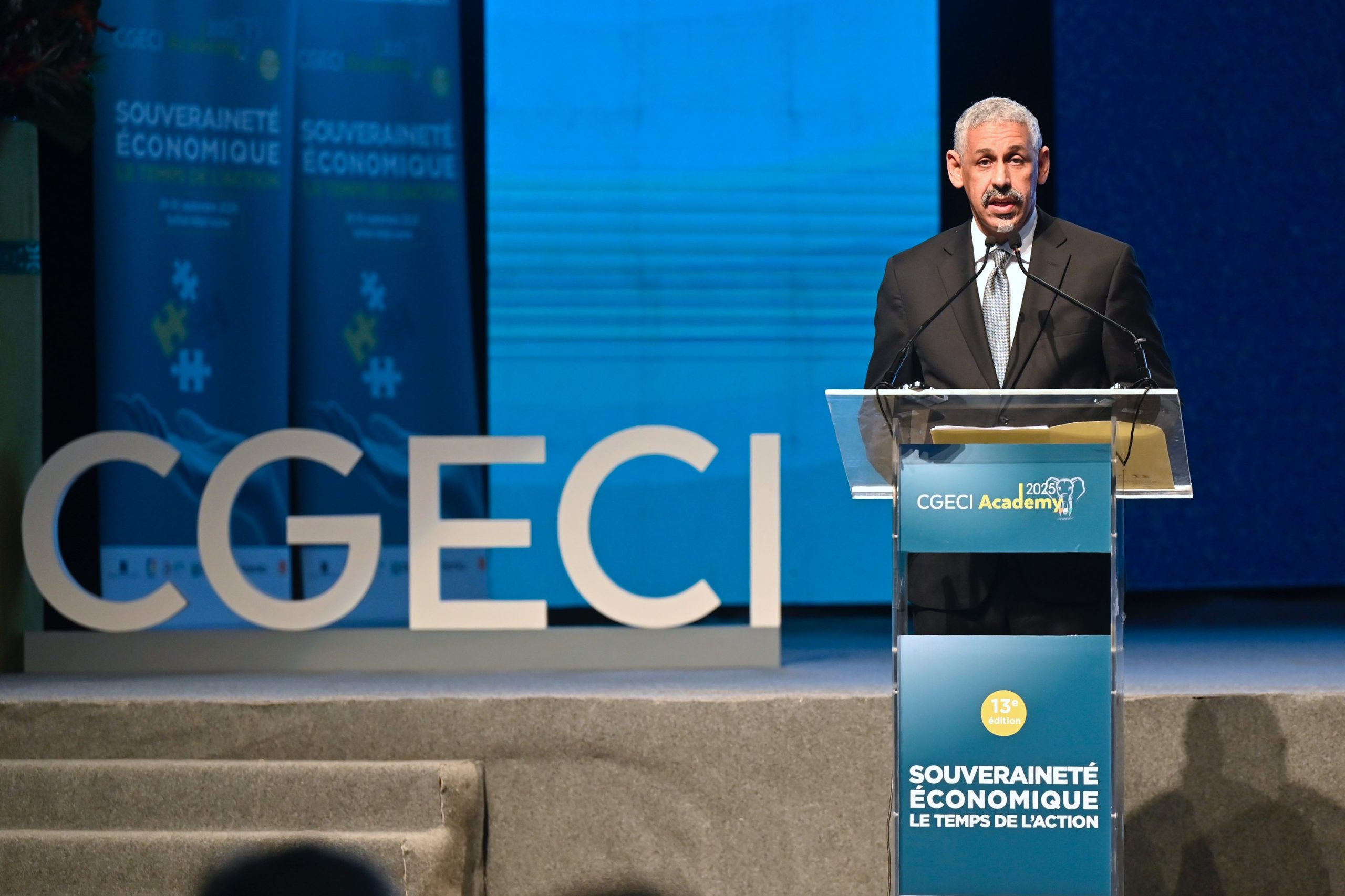
Ivorian Prime Minister Robert Mambé and African Development Bank Group President Sidi Ould Tah have urged Africa’s private sector to take centre stage in the continent’s economic transformation, stressing that the current global trade disruptions present an opportunity rather than a threat.
The two leaders were speaking on Monday at the opening of the 13th edition of the CGECI Academy, the flagship annual forum of Côte d’Ivoire’s employers federation, held under the theme “Economic sovereignty: Time for Action.” The two-day event drew senior government officials, business leaders, and representatives of regional employers’ organisations.
Prime Minister Mambé underscored the urgency of moving beyond analysis to action. “The time for self-analysis is over; it’s now time for action!” he reiterated. “We must become aware of our strengths, our weaknesses and our untapped potential, and most importantly, we must establish a synthesis that consolidates our achievements for new prospects that are based on intelligent and dynamic partnerships.”
He stressed that economic sovereignty requires coordinated effort from government, private investors, young entrepreneurs, and consumers.
Dr Ould Tah echoed this call, telling the gathering that Africa must turn the current global trade tensions into a “historic opportunity” to strengthen regional value chains and process more of its abundant raw materials locally.
“For Africa, this is not a threat; it is a historic opportunity to establish a stronger, more integrated and more resilient local economy,” the Bank President said.
Dr Ould Tah, who assumed office on September 1, outlined his four-pillar strategy for Africa’s development: mobilising large-scale capital, reforming Africa’s financial architecture, accelerating the creation of quality jobs, and building climate-resilient infrastructure with green industrialisation.
He emphasised that structural economic transformation cannot be achieved by governments alone. “They will also come from the African private sector, which must be central to the strategy,” the Bank president said, calling on entrepreneurs to innovate and become major players in global markets.
The gathering comes as multilateral trade frameworks face mounting pressure from protectionist policies and geopolitical tensions. African leaders see the moment as critical for the continent to strengthen intra-African commerce and reduce dependence on external markets.
Ahmed Cissé, president of CGECI, pledged the private sector’s support for continental efforts to restore economic and financial sovereignty through institutional partnerships, including “working closely” with the African Development Bank.
The CGECI, which represents nearly 80 percent of Côte d’Ivoire’s private sector companies, has a long-standing partnership with the African Development Bank to boost youth entrepreneurship. Their joint initiative, La finance s’engage (Finance Commits) has mobilised resources for hundreds of Ivorian start-ups since 2016, including a €1.108 million project that has supported 200 young entrepreneurs, nearly a third of them women.
CEO Insights
Crafting Exceptional Training Solutions for Luxury Professionals and Brands: A Chat with David Osadolor
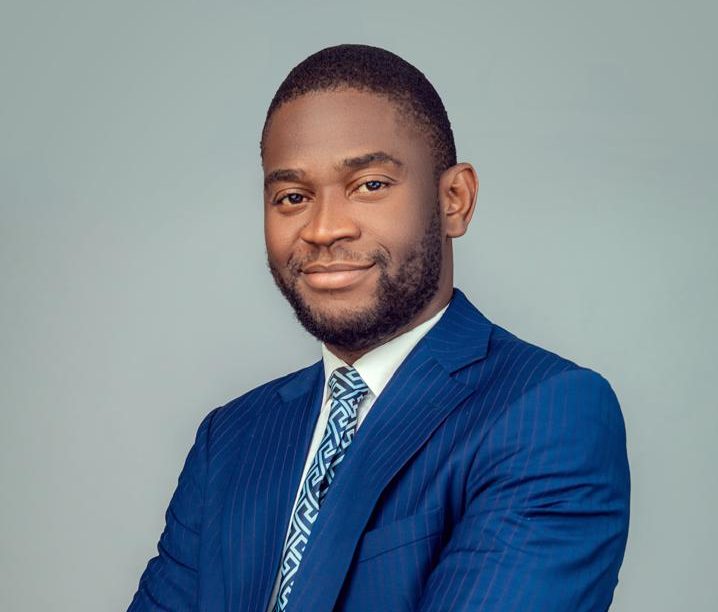
David Osadolor is the lead consultant at DameOasis Consulting and brings more than thirteen (13) years of experience in the luxury retail sector. His career journey has taken him through Switzerland, Dubai, and Germany, where he underwent extensive training and gained mentorship from leading industry figures. Over the years, he has successfully managed prestigious Swiss brands such as Hublot, Tag Heuer, Ulysse Nardin, Bvlgari, and Louis Moinet. His leadership extends beyond business, as he currently serves as the President of the Nigerian Young Professionals Forum, where he continues to inspire growth and innovation. In this exclusive interview with Alaba Ayinuola of Business Africa Online (BAO), David shares valuable insights on how he is empowering luxury professionals and brands through bespoke training programs, and more. Excerpts.
Alaba: Could you briefly tell us about DameOasis Consulting, and what inspired you to start it?
David: With over 13 years of distinguished experience in the luxury industry, spanning fashion, hospitality, interior décor, lifestyle, watches, high jewelry, high-end accessories, as well as premium wine and whiskey, I realized that while Nigeria’s luxury retail space is growing, there remains a significant knowledge and service gap compared to international standards. For me, the inspiration behind DameOasis Consulting stems from a passion to transfer the knowledge I’ve acquired over the years, and to raise the bar for luxury service and client experience in Nigeria.
Our focus is on enriching the professionals who engage directly with clients, whether through products or services, by equipping them with the right skills in luxury sales, customer service, cold calling, pitching, and overall client engagement. When service is elevated, the entire ecosystem benefits, and Nigeria can begin to reflect a true luxury culture.
The name “DameOasis” is also deeply personal. “Dame” combines my name, David, and my wife’s name, Mercy. “Oasis” connotes water, which symbolizes life and renewal. We see ourselves as springing forth something new and vital in Nigeria’s luxury space, the first of its kind dedicated to truly redefining service and experience.
Alaba: How do you define luxury, and what sets your approach apart from others in the industry?
David: Luxury has many definitions, but one of the most profound I encountered during a course with the LVMH group captures it in four dimensions:
- Emotions beyond ownership
- Creativity beyond trend
- Quality beyond aesthetics
- Legacy beyond desire
For me, any true luxury product or service must embody these four qualities. It must be more than a status symbol, it should stir emotions, reflect timeless creativity, go beyond surface beauty, and leave behind a lasting legacy. What sets DameOasis apart is our insistence on these principles. We don’t just talk about selling luxury products; we focus on creating experiences, shaping perceptions, and instilling the mindset required to serve clients at the highest level.
Alaba: What specific challenges do luxury professionals and brands face, and how does your firm address these challenges?
David: The biggest challenge we see in Nigeria’s luxury industry is the gap in service quality. While brands invest heavily in bringing products into the country, the client experience often falls short of global standards. In addition, the word “luxury” has been overused and misapplied, with many businesses claiming the label without truly meeting its requirements.
At DameOasis, we address these gaps by bridging knowledge and skill shortages, helping professionals understand what authentic luxury is and how to deliver it. Our trainings elevate both service and product delivery, ultimately driving customer loyalty and increased revenues for brands.
Another challenge is cultural, many clients still prefer shopping abroad, which drains capital from the local economy. Through our work, we’re fostering a cultural shopping shift by connecting high-net-worth individuals (HNIs) with local professionals and brands, ensuring they can enjoy the same quality of service and authenticity here in Nigeria.
Alaba: How do you tailor your training programs to meet the unique needs of each client?
David: Our approach is highly customized. Luxury is a broad industry, covering fashion, watches, jewelry, hospitality, lifestyle, Real Estates and automobiles, so we always tailor our programs to the specific sub-sector and the client’s needs.
When engaged, we don’t just accept an organization’s brief at face value. We conduct a thorough needs assessment, including speaking to staff, clients, and management. This allows us to pinpoint the real gaps and design training that directly addresses them.
We also balance global best practices with local realities. Having been trained by some of the best in the international space, we adopt global trends but adapt them to suit Nigeria’s dynamic customer culture, ensuring our programs remain both world-class and locally relevant.
Alaba: What topics or areas do your training programs typically cover, and how do you ensure they stay relevant and effective?
David: Our programs cover a wide range of topics, from core luxury sales and customer engagement to leadership, business transformation, and client experience management. Depending on the client’s sub-sector, we include specialized modules such as cold calling, luxury storytelling, clienteling, and emotional intelligence in sales.
To remain relevant, we constantly update our content based on international trends, insights from our global partners, and ongoing research. At the same time, we refine our materials to reflect Nigeria’s unique market dynamics, so participants can apply what they learn directly in their day-to-day roles.
Alaba: How do you measure the effectiveness of your training programs, and what outcomes have you seen?
David: We measure effectiveness through a combination of short-, medium-, and long-term assessments. Immediately after training, participants complete feedback forms, and we provide handbooks to HR teams for continued reinforcement.
Beyond that, we follow up with organizations to monitor how trainees are applying the skills. We also engage CEOs, HR leaders, and most importantly customers. If customers notice improved service and return to repurchase, then we know the training has delivered its intended results. Luxury is about building loyalty, and the ultimate proof of impact is customer satisfaction and brand loyalty.
Alaba: What feedback have you received from clients, and how has it shaped your approach to consulting?
David: Feedback has been overwhelmingly positive, but it has also been instrumental in shaping our evolution. Clients appreciate the practical, hands-on nature of our trainings, as well as the international perspectives we bring.
We actively encourage feedback, not just from trainees, but also from clients, mentors, international partners, and even through online engagements. This feedback helps us innovate in areas such as training delivery, networking sessions, technology use, and follow-up systems. We see ourselves as a learning organization, always adapting to serve better.
Alaba: Lastly, what trends do you see shaping the luxury industry in the coming years, and how will your firm adapt?
David: Globally and locally, several trends are emerging. One is radical transparency, particularly driven by Gen Z consumers, who want to know the full story behind any product they buy.
Another is the growth of the pre-owned luxury market, as ownership models evolve and more people seek to experience luxury in flexible ways. We also anticipate stronger omni-channel experiences, with digital retail growing rapidly while physical boutiques evolve into experiential spaces where customers can immerse themselves in luxury.
Most importantly, the market will increasingly demand authenticity. The line between genuine and fake will become clearer, and only brands and professionals who deliver true value and service will thrive. At DameOasis, we’re preparing our clients for this future by ensuring they are trained to meet international standards, embrace technology, and remain authentic custodians of luxury in Nigeria and Africa.
Business Home
Global Africa Business Initiative’s ‘Unstoppable Africa’ 2025 Puts Africa at the Center of Global Growth

New York’s Times Square became the stage for Africa’s economic ambitions today as heads of state, business leaders, investors, and policymakers gathered for Unstoppable Africa 2025, the flagship forum of the Global Africa Business Initiative (GABI).
The gathering which took place at the Marriott Marquis, in Times Square, marked a decisive shift in the global conversation – from doing business in Africa to doing business with Africa – with energy, critical minerals, healthcare, education, and the creative industries driving a powerful narrative of Africa as the engine of the world’s next wave of growth. The event was held just ahead of the 80th United Nations General Assembly and was hosted by UN Secretary-General António Guterres and H.E. Mahmoud Ali Youssouf, Chairperson of the African Union Commission. CNN’s Larry Madowo and Al Jazeera’s Folly Bah Thibault returned as moderators.
In his opening remarks at Unstoppable Africa 2025, António Guterres, Secretary-General of the United Nations, highlighted Africa’s growing influence at a time of global disruption and opportunity.
“The world meets at a time of turbulence and opportunity, and Africa stands at the centre of that opportunity. Africa is home to the world’s youngest population, has vast energy resources, and extraordinary creativity across sectors -from fintech and agribusiness to fashion and artificial intelligence. Our challenge and responsibility is to turn these extraordinary possibilities into sustainable prosperity, in line with the Sustainable Development Goals, Agenda 2063, and the Pact for the Future.”
Ms. Sanda Ojiambo, Assistant Secretary-General and CEO of the UN Global Compact, added: “The time has come to embrace a new narrative for Africa. This narrative is imperative. We are shifting from doing business in Africa to doing business with Africa. Since our last forum, GABI has maintained momentum by convening alongside several African organizations and continues to do so.”
GABI was formed in 2022 to rebalance the way business is done in Africa. Its focus is on sustainable business aligned with Agenda 2063 and the SDGs. GABI prioritizes several themes: Energy, Trade, Digital Transformation, Food Systems, Education, Health, Fashion & Creative industries, and Sports.
GABI and its partners aim to build a strong, inclusive private sector that derisks economies, attracts investment, creates jobs, and promotes prosperous, sustainable communities across Africa.
One highlight was a closed-door meeting between the UN Secretary-General, Mahmoud Ali Youssouf, H.E. João Lourenço, President of Angola, UN Deputy Secretary-General, Strive Masiyiwa and other African business leaders. Fourteen CEOs and heads of multilateral organizations, representing companies based in 16 African countries with a combined revenue of US$22 billion, called on governments to do more to improve the business environment. They emphasized the need for policies that support industrial growth, regional trade, and long-term investment.
Founder and Executive Chairman, ECONET Global and Cassava Technologies, Strive Masiyiwa said: “Unstoppable Africa has become a powerful platform for African and global leaders, and the world’s biggest companies to engage with Africa.”
Throughout the day, participants highlighted key priorities for Africa’s development, including expanding access to energy, accelerating clean energy adoption, improving healthcare and education, and supporting creative and sports industries.
Reflecting on Africa’s potential, H.E. Mahmoud Ali Youssouf, Chairperson of the African Union Commission, said: “Unstoppable Africa is more than a slogan. It is, first and foremost, a recognition of our potential and a determination to act, to transform the daily lives of African citizens. Building a just, sustainable, and prosperous world will be anchored in shared values, environmental stewardship, and equitable partnerships among governments, international institutions, the private sector, and civil society”.
A trade session explored Africa’s position in a rapidly changing global economy. In light of rising protectionism, tariff disputes, and the weakening of long-standing trade agreements, speakers examined how Africa can adapt to a more fragmented global landscape. World Trade Organization (WTO) Director-General Dr. Ngozi Okonjo-Iweala set the scene in a fireside chat, noting that global companies are seeking to diversify supply chains and that Africa stands out as a destination for growth. She highlighted opportunities in industries such as textiles and oil palm and emphasized that, with over one-third of key mineral reserves, local processing can support green energy supply chains.
H.E. João Lourenço, President of Angola, highlighted the potential of the Lobito Corridor to boost regional trade and industrial growth. He noted that the corridor connects the Atlantic and Indian Oceans, supports a broad economic zone, and can attract private investment to drive production, processing, and exports across Africa.
H.E. Duma Boko, President of Botswana, called for harmonized laws and systems across Africa to facilitate trade. He emphasized the importance of shared investment in infrastructure, including the Lobito Corridor, and urged stronger public-private partnerships, faster approvals, and streamlined processes to enable business growth.
Another session focused on Africa’s growing importance in the global supply of critical minerals essential to the energy transition and digital technologies. Hon. Bogolo Kenewendo, Minister of Minerals and Energy of Botswana, outlined plans to develop local hubs around mines to ensure processing and value addition happen within the country, keeping more economic value in Botswana and strengthening domestic industry.
Mr. Paul Hinks, Chairman and CEO of Symbion Power and HYDRO-LINK, highlighted the strategic importance of rare earths and other critical minerals. He noted global reliance on China for processing and emphasized the growing demand from partners like the United States for alternative, locally processed sources to strengthen supply chain resilience.
Dr. Rajiv Shah, President of the Rockefeller Foundation, highlighted that by the end of the week, 32 nations are expected to sign energy agreements detailing new policies and plans to expand electrification. African leaders also aim to mobilize over $50 billion in affordable finance, supporting Mission 300, the continent-wide goal to accelerate access to reliable power.
An insightful panel on financing Africa’s green industrial future highlighted the importance of local financial leadership in driving the continent’s energy transition. Alain Ebobissé, CEO of Africa50, called for Africans to take the lead in driving the continent’s development while engaging global partners. He emphasized the need for speed and increased investment, noting that African institutional investors manage over US$2 trillion, yet less than 3% is allocated to infrastructure. Increasing this to 5% could significantly close the funding gap.
In the side event, the Africa Business Leaders Coalition (ABLC), convened a round table focused on unlocking trade in Africa. 14 CEOs representing over US$20 billion of annual turnover in Africa, shared candid feedback with the Deputy Chair and Commissioner for Economic Development, African Union Commission, Her Excellency, Selma Malika Haddadi, calling for harmonised regulations across the continent.
Day Two of Unstoppable Africa 2025 will continue with discussions on trade, digital innovation, food systems, and investment opportunities across the continent.
-
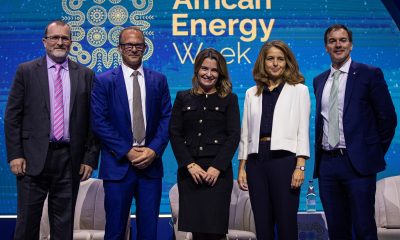
 Oil and Gas3 days ago
Oil and Gas3 days agoTotalEnergies, Chevron Push for Faster Permits, Better Seismic Data in Africa
-
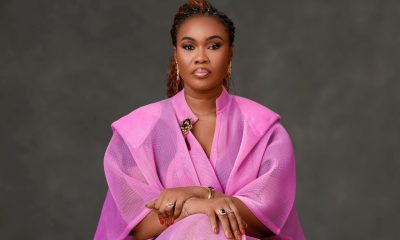
 Afripreneur24 hours ago
Afripreneur24 hours agoRevolutionizing Cross-Border Payments in Africa: An Exclusive Interview with Onyinye Olisah
-
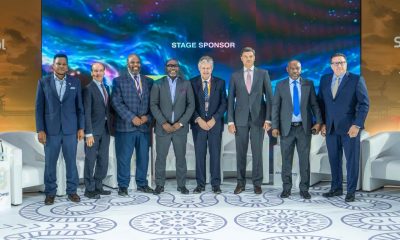
 Energy3 days ago
Energy3 days agoUnited States (U.S.) Political Will, African Reforms Signal New Era for Energy Investment
-
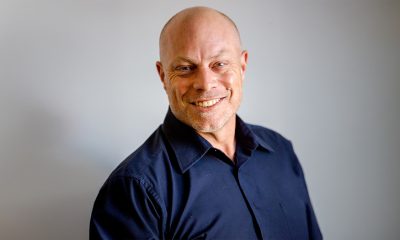
 Op-Ed2 hours ago
Op-Ed2 hours agoThe Black Friday remix: What 2025 will look like after a rule-changing 2024
-
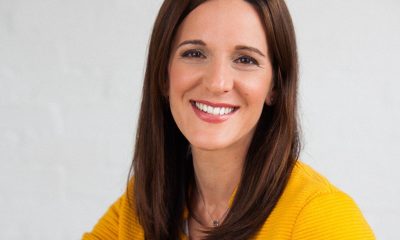
 Op-Ed23 mins ago
Op-Ed23 mins agoThe rise of the “shadow employee”: When ex-employees still have access




